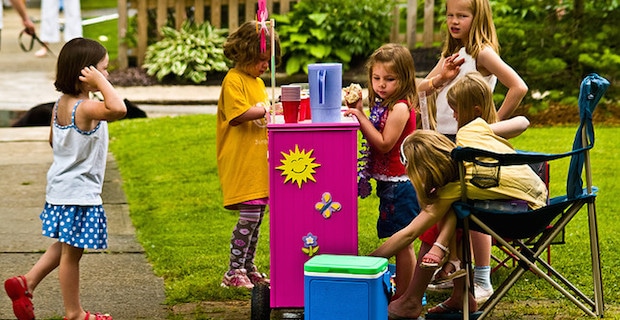
When warm weather hits, most kids want to spend the entire summer playing outside. In addition to wearing cool clothing, sunscreen, hats and sunglasses, it’s important to send kids outdoors with enough water to drink to prevent dehydration.
Dehydration is a condition that occurs when someone loses more fluids than he or she takes in, and in the hot summer heat, this loss usually occurs through excessive sweat. Sweating is a great cooling system, but on a hot summer day, your child could be losing too much water through their skin. When someone experiences dehydration, the amount of water in their body has dropped below the level needed for normal body function. Once a child becomes dehydrated, he or she is vulnerable to more serious heat-related illnesses such as heat cramps, heat exhaustion or heatstroke, the latter being a medical emergency.
Read more about exercise and dehydration
Recognize the Signs
Two of the early signs of dehydration are irritability and fatigue. So if your child becomes crabby, or seems to have lost their get-up-and-go, it’s time to get them out of the heat for a water break. Do not wait until they ask for a drink to determine if they are becoming dehydrated. Thirst is usually not a good indication of dehydration since most of us, especially children, do not have a good thirst mechanism; by the time our brains register that we are thirsty, we’re already dehydrated. Regular small sips of fluid will replenish lost water and help keep our internal temperature in check.
If your child appears weak, complains of a headache or nausea, has clammy skin and begins to vomit, they may have heat exhaustion. KidsHealth.org suggests taking the following steps if you suspect heat exhaustion:
- Bring your child indoors or into the shade.
- Loosen or remove your child's clothing.
- Encourage your child to eat and drink.
- Give your child a bath in cool (not cold) water.
- Call your child's doctor for further advice. If your child is too exhausted or ill to eat or drink, intravenous fluids may be necessary.
Water, juice, soda or power drinks?
Calorie- and caffeine-free, water is by far superior to soda or juice to prevent dehydration. Some soda contains caffeine, which is a diuretic, and will cause your child to lose, rather than retain, fluids. The excess sugar in soda also adds unnecessary and empty calories to your child’s diet and can have an adverse effect on dental hygiene.
Fruit juice quenches thirst and contains vitamins and nutrients, however it is also high in calories, can contribute to unnecessary weight gain, and can be full of scary chemicals. A small serving or two of juice a day is fine with breakfast or snacks, but when loading up on fluids to stay cool, it’s best to stick with water to prevent dehydration. If your child insists on juice, try diluting it by mixing 1/4 cup of juice to 3/4 cups of water. Or, sweeten water naturally by adding a few berries or a squeeze of lemon or orange for a flavorful twist.
Power drinks, with their colorful array of enticing flavors, have become increasingly popular with older children. These can include anything from sports beverages to vitamin waters to "high-energy" supplement drinks. What they all have in common is added ingredients that say they "do" something extra, whether it is to increase energy and alertness, boost nutrition, or even enhance athletic performance. But are they right for your child?
According to nutritionists at the Children Nutrition Research Centre at the Baylor College of Medicine in Houston, Texas, sports drinks offer little advantage over cool water. Sports drinks are designed to benefit athletes engaged in continuous, high-intensity aerobic workouts which last for 90 minutes or more. Many times older kids are so preoccupied with an outdoor activity that they play to the point of heat exhaustion. Parents need to make sure older kids have plenty to drink before and during play. It’s also important to teach kids to listen to their bodies and be aware of the signs of dehydration and heat exhaustion. Try to encourage kids who participate in strenuous outdoor sport activities, like soccer or track, to play outdoors before noon or after 6 P.M when the sun isn’t as strong.
Read more about healthy alternatives to sports drinks
How much water should kids drink?
The amount of liquid children need depends on the heat, degree of activity, and how long they play outside. To ensure your child is getting enough water, offer it at least 6 times a day, even if they are not thirsty. When playing outdoors, ensure your child has a full bottle of cool water and encourage him to occasionally take a break and have a sip. Make sure the bottle is refilled when necessary. Active kids, in particular, should rehydrate every 15 to 20 minutes to help prevent heat-related illnesses.
Summer is a wonderful time for kids as it is full of adventure, games and memories to last a lifetime. Keeping them hydrated will ensure they can enjoy the beautiful outdoors safely.
Image: C.J. Peters
References:
Baylor College of Medicine, “Kids on the go need H2O”, bcm.edu/news/item.cfm?newsID=656
KidsHealth, “Heat Exhaustion and Heat Stroke”, kidshealth.org/parent/fitness/safety/heat_exhaustion_heatstroke_sheet.html










